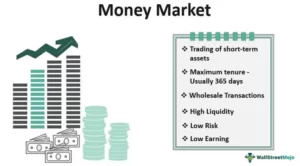Back to: Store Management SS 2
Welcome to today’s class!!
We are thrilled to have you in our class!!
In today’s Store Management class, we will be learning about Instrument of Trade in the Money Market
Instrument of Trade in Money Market

Because the Money Market is considered a safe place to invest due to the high liquidity of securities, we can find instruments being traded there.

Some of the instruments traded in the money market include Treasury bills, certificates of deposit, commercial paper, federal funds, bills of exchange, and short-term mortgage-backed securities and asset-backed securities.
Treasury Bills
Treasury Bills, also known as T-Bills, are government-backed, short-term securities issued by the CBN. They are issued when the government needs to borrow funds for a period of time. They have a maximum maturity of 364 days. T-Bills are sold at a discount from their face value. Although similar to a short-term bond, t-bills are different and offer low yields compared to high-risk investments.
Treasury Bills are sold through a bi-weekly auction by the CBN. Buyers quote bids and the average minimum bid is selected. The Government sells these bills at a lower price (lower than face value). Next, the investor holds on to the T-Bills until the maturity date, and eventually, is paid the full price of the face value.
Certificate of Deposit (CD)
Certificate of Deposit (CD) is a savings account that holds a fixed amount of money for a fixed period of time, such as six months, one year, or five years, and in exchange, the issuing bank pays interest. When you cash in or redeem your CD, you receive the money you originally invested plus any interest. Certificates of deposit are considered to be one of the safest savings options.
Commercial Paper
Commercial Paper refers to a short-term, unsecured debt obligation that is issued by financial institutions and large corporations as an alternative to costlier methods of funding. It is a money market instrument that generally comes with a maturity of up to 270 days.
Commercial paper is often referred to as an unsecured promissory note, as the security is not supported by anything other than the issuer’s promise to repay the face value at the maturity date specified on the note.
Federal Funds
Federal Funds, often referred to as fed funds, are excess reserves that commercial banks and other financial institutions deposit at regional Federal Reserve banks; these funds can be lent, then, to other market participants with insufficient cash on hand to meet their lending and reserve needs. The loans are unsecured and are made at a relatively low interest rate, called the federal funds rate or overnight rate, as that is the period for which most such loans are made.
Federal funds help commercial banks meet their daily reserve requirements, which is the amount of money that banks are required to maintain at their regional Federal Reserve. Reserve requirements are based on the volume of customer deposits that each bank holds.
Bill Of Exchange
Bill Of Exchange is a written order used primarily in international trade that binds one party to pay a fixed sum of money to another party on demand or at a predetermined date. Bills of exchange are similar to checks and promissory notes—they can be drawn by individuals or banks and are generally transferable by endorsements.
A bill of exchange transaction can involve up to three parties. The drawee is the party that pays the sum specified by the bill of exchange. The payee is the one who receives that sum. The drawer is the party that obliges the drawee to pay the payee. The drawer and the payee are the same entity unless the drawer transfers the bill of exchange to a third-party payee.
In summary, the Money market has become a component of the financial market for buying and selling of securities of short-term maturities of one year or less, such as treasury bills and commercial papers.
Evaluation
Explain the difference between Federal Funds and Commercial Papers
Reading Assignment
Define Money Market
Weekend Assignment
List and Explain five instruments of trade in Money Market.
We hope you enjoyed today’s class. In our next class, we will be talking about the Difference Between Bonds And Shares.
Let us know your thoughts and questions in the comment section, and we will attend to them as fast as we can.
